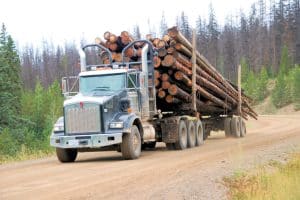The Unique Liability Issues of Logging Truck Accidents in Rural Areas
 The economy of the Pacific Northwest is heavily dependent on the logging industry. Unsurprisingly, logging truck accidents are common. These types of accidents generate special concerns for a variety of reasons—their typically remote locations, road and weather conditions, and complex chains of liability, among other factors. Accidents tend to be serious, and wrongful death claims are not uncommon.
The economy of the Pacific Northwest is heavily dependent on the logging industry. Unsurprisingly, logging truck accidents are common. These types of accidents generate special concerns for a variety of reasons—their typically remote locations, road and weather conditions, and complex chains of liability, among other factors. Accidents tend to be serious, and wrongful death claims are not uncommon.
Hazardous conditions
Hauling logs is hazardous in just about every possible way. Truckers often carry irregular loads, forest roads are often unpaved, truck maintenance can be poor, and truckers frequently operate in areas far from law enforcement or medical help. It is often difficult to reach the scene of an accident, and it is difficult to collect evidence later. Emergency services can take hours to arrive, and police reports often contain little useful information.
Poor truck maintenance
Poor vehicle maintenance often contributes to accidents. The logging companies or truckers who own these trucks often operate on tight budgets that leave funding for critical maintenance dangerously low.
The Federal Motor Carrier Safety Regulations (FMCSRs) require regular inspection and maintenance of logging trucks. Nevertheless, the reality is that logging trucks are often based in rural areas far from big cities. While they’re subject to many of the same federal and state safety regulations as other commercial trucks, compliance and enforcement may be more difficult in rural areas. The conditions can lead to less frequent inspections in practice.
Cargo loading defects
Logs, unlike manufactured items, do not come in uniform sizes. They are irregular and often difficult to fit onto the back of a truck. This renders loading uneven, making it difficult for drivers to stabilize their vehicles. Tight budgets mean that logging companies often pressure drivers into overloading their trucks, resulting in a high center of gravity. Overloading can cause brake failure, rollover accidents, and jackknife accidents.
Cargo might also be improperly secured. Logging roads offer bumpy rides—logs might even come loose from the truck and strike another vehicle. Improper cargo loading is relatively easy to document, and it can form the basis of a negligence claim against whoever was responsible for loading the cargo.
Evidence collection difficulties
When a logging truck accident occurs, a truck accident lawyer must act quickly to preserve critical evidence such as truck maintenance records, logbooks, and data from the truck’s electronic control module. This can be a challenge if the accident happened in a remote area on a muddy dirt road, especially during poor weather.
Driver fatigue
Economic realities often pressure logging truck drivers into working long hours. This results in fatigue and, in a worst-case scenario, drivers falling asleep at the wheel. Logging roads are typically unlit, making driving particularly hazardous after dark.
Some logging truck drivers may qualify for exemptions from certain hours-of-service rules under federal or state short-haul provisions, but they are not entirely exempt from all safety regulations. Still, these drivers may start work before dawn and continue until well after sunset, transporting logs from forests to remote processing mills. Fatigue impairs situational awareness and slows reaction time.
Inadequate driver training
Driving a truck is far more difficult than driving a car. Driving a logging truck, especially on dirt roads, in mountainous terrain, is even more difficult. Drivers need extensive training to safely operate a fully-loaded logging truck through difficult terrain. Economic pressures incentivize drivers to “cut corners” both literally and figuratively. An employer who fails to ensure that their driver is properly trained can bear liability for any resulting accident.
Complex chains of liability
So who do you hold responsible for a logging truck accident? These are many possible parties—the driver, the logging company, the truck maintenance company, subcontractors, a timber company, or a landowner. A conscientious truck accident lawyer will need to discover who owned the truck, who hired the driver, who loaded the cargo, and who set delivery schedules and routes.
These parties are often linked through a complex web of contractual relationships. Contracts often contain liability waivers. The driver might be an independent contractor rather than an employee, making it difficult to hold the employer liable for an accident. Meanwhile, insurance policies might be complex and confusing. Don’t try to handle a case like this on your own.
Environmental factors
Snow, ice, and rain can make mountain roads difficult or even impossible to pass. In some cases it was not the weather that caused the accident, but the driver’s response to the weather. Other times, the weather might render an accident unavoidable.
Case strategy
The combination of environmental risk factors and the intricate structure of the timber industry can render a logging truck accident case a jigsaw puzzle. Nevertheless, the right strategy and a deep understanding of the nuances of the logging industry can help an experienced local truck accident lawyer hold negligent parties accountable for their misconduct. Below are some case management tips that apply with particular urgency to logging truck accidents.
Gather evidence immediately after the accident
Logging truck accidents often occur in remote areas, where the weather can quickly degrade physical evidence. Don’t forget to gather maintenance logs, electronic control module data, load manifests, and communications between the driver and the dispatcher. You might need to file an emergency motion for the preservation of evidence.
Identify potential defendants and piece together their role in the accident
Investigate the role of each party involved in the accident. Even a thorough investigation might not be enough if most of the evidence is in the hands of the opposing party. You might need to file a lawsuit simply to gain access to the pretrial discovery process so that you can demand evidence such as contracts and corporate records. You might also need to depose the opposing party’s witnesses.
Use federal and state regulatory networks to establish liability
Trucking is a heavily regulated industry. Although certain federal exemptions may apply to specific types of logging truck operations, both federal and Washington state regulations still impose extensive safety and operational requirements. If you can find a regulation that the defendant (or potential defendant) violated, you can much more easily prove the defendant negligent, under the doctrine of negligence per se.
Bring in experts early
You might need an accident reconstruction specialist, a cargo securement specialist, or a forensic trucking consultant. Sometimes, you might need to hire a consulting witness who won’t even testify, just to understand the case and to know which questions to ask. Of course, expert assistance is often too expensive for small claims. For large claims (as logging truck accidents often are) they can be well worth it.
To reach settlement, be ready for trial
Ironically, the best way to avoid a trial is to be ready for one. So start collecting evidence early, and bundling it into exhibits. Interview witnesses, and always focus on the admissibility of your evidence. Once the opposing party realizes you’re ready for trial, they’re likely to settle.
Injured in a logging truck accident? Contact a truck accident lawyer
If you have been injured in a logging truck accident, you’re likely to be facing challenges that are unique to logging truck accidents. Because of this, you are going to need a truck accident lawyer who is familiar with this kind of case. Philbrook Law is such a firm. Our attorneys have handled over 2,000 personal injury claims in Washington state, including numerous logging truck accidents.

Founding Attorney Matthew Philbrook attended Clark College, Washington State University, and Gonzaga University School of Law. He is a member of the Washington State and Oregon State Bar Associations and started Philbrook Law in 2005. He specializes in Personal Injury, DUI and Criminal Defense cases. Learn more about Mr. Philbrook.

